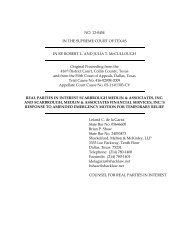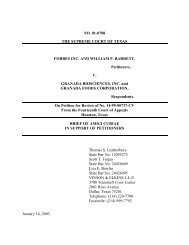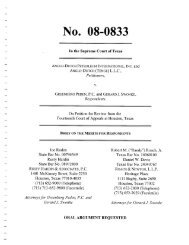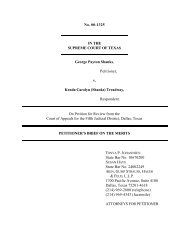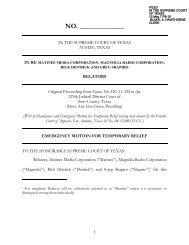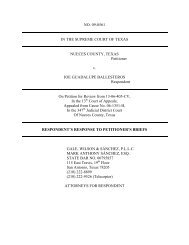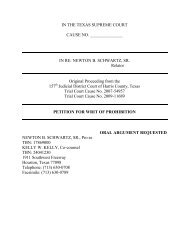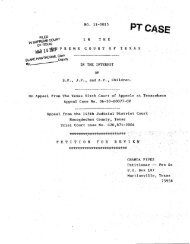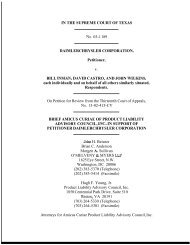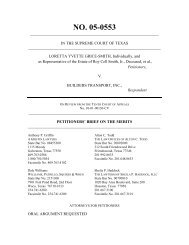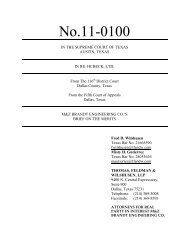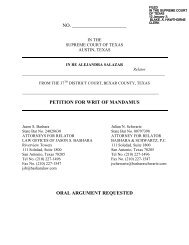NO. 10-0859 - Supreme Court of Texas
NO. 10-0859 - Supreme Court of Texas
NO. 10-0859 - Supreme Court of Texas
You also want an ePaper? Increase the reach of your titles
YUMPU automatically turns print PDFs into web optimized ePapers that Google loves.
Page 12<br />
Not Reported in S.W.3d, 20<strong>10</strong> WL 2789649 (Tex.App.-Austin)<br />
(Cite as: 20<strong>10</strong> WL 2789649 (Tex.App.-Austin))<br />
recanted when she was eleven years old, and when<br />
she later testified at the habeas hearing, she had not<br />
yet turned eighteen. As for A.A., he was only sixteen<br />
years old at the time <strong>of</strong> the habeas hearing. Perhaps<br />
more importantly, there was considerable evidence<br />
presented in this case tending to show that the recantations<br />
themselves may have been the product <strong>of</strong><br />
pressure applied to the children by their father, the<br />
father's family, and the father's “investigator.” No<br />
comparable evidence was discussed in Elizondo or<br />
Thompson.<br />
*14 As the record reflects, this case arose during a<br />
prolonged and bitter custody battle between Stephan<br />
and LaVonna Arena. The district court considered the<br />
allegations and subsequent recantations made by their<br />
children accordingly. Having reviewed the entire<br />
record, it is apparent that there is evidence supporting<br />
both M.P.A.'s and the State's version <strong>of</strong> events. In the<br />
end, which version to believe turns largely on credibility<br />
determinations that the district court, which had<br />
the opportunity to observe the recanting witnesses<br />
(and their father) in person, was in the best position<br />
to assess. We must be mindful that our role here is<br />
simply to review the district court's finding and ensure<br />
that it is supported by the record. On this record,<br />
viewing the above evidence in the light most favorable<br />
to the district court's ruling, we cannot conclude<br />
that the district court abused its discretion in finding<br />
that M.P.A. had not met his “extraordinarily high”<br />
burden <strong>of</strong> proving that no reasonable juror could have<br />
convicted him in light <strong>of</strong> the new evidence. See Ex<br />
parte Brown, 205 S.W.3d 538, 545<br />
(Tex.Crim.App.2006) (characterizing applicant's burden<br />
to prove actual innocence as “a Herculean task”);<br />
Ex parte Franklin, 72 S.W.3d at 677 (explaining that<br />
when habeas applicant claims actual innocence, applicant<br />
bears “the burden <strong>of</strong> proving his innocence<br />
not just raising doubt about his guilt”); see also<br />
Keeter v. State, 74 S.W.3d 31, 38<br />
(Tex.Crim.App.2002) (holding that trial court acts<br />
within its discretion in denying motion for new trial<br />
on basis <strong>of</strong> recanted testimony “so long as the record<br />
provides some basis for disbelieving the testimony.<br />
Such bases include, but are not limited to: evidence<br />
that the recanting witness was subject to pressure by<br />
family members ... [and] circumstances showing that<br />
the complainant recanted after moving in with family<br />
members <strong>of</strong> the defendant”).<br />
We overrule M.P.A.'s first issue.<br />
Ineffective assistance <strong>of</strong> counsel at delinquency<br />
hearing<br />
In his second issue, M.P.A. urges that the district<br />
court abused its discretion in refusing habeas relief<br />
based on ineffective assistance during the delinquency<br />
hearing. To obtain habeas corpus relief for<br />
ineffective assistance <strong>of</strong> counsel under the Strickland<br />
v. Washington, 466 U.S. 668, <strong>10</strong>4 S.Ct. 2052, 80<br />
L.Ed.2d 674 (1984), standards, applicant must show<br />
that counsel's performance “was deficient and that a<br />
probability exists, sufficient to undermine our confidence<br />
in the result, that the outcome would have been<br />
different but for counsel['s] deficient performance.”<br />
Amezquita, 223 S.W.3d at 366 (quoting Ex parte<br />
White, 160 S.W.3d 46, 49 (Tex.Crim.App.2004)).<br />
Counsel's performance is deficient if it is shown to<br />
have fallen below an objective standard <strong>of</strong> reasonableness.<br />
Strickland, 466 U.S. at 687-88. Prejudice to<br />
the applicant from counsel's deficient performance is<br />
judged by “whether counsel's conduct so undermined<br />
the proper functioning <strong>of</strong> the adversarial process that<br />
the trial cannot be relied on as having produced a just<br />
result.” Ex parte Chandler, 182 S.W.3d 350, 353<br />
(Tex.Crim.App.2005) (quoting Strickland, 466 U.S.<br />
at 686).<br />
*15 M.P.A. insists that his trial counsel, Bobby<br />
Barina, was ineffective during the delinquency hearing<br />
by (1) failing to interview and call as a witness<br />
Adair Pickard, the counselor for Catholic Charities in<br />
Florida who, in 2000, allegedly wrote a letter to<br />
Stephan that during therapy sessions in 1997, the<br />
children “denied abuse and no definitive indicators<br />
[<strong>of</strong> abuse] were noted”; (2) failing to introduce evidence<br />
that during her videotaped interview with Kris<br />
Weis, “[S.A.] became very anxious and said that she<br />
couldn't continue because she needed to talk to her<br />
mother”; and (3) failing to refute Dr. Green's expert<br />
testimony. In regard to M.P.A.'s ineffectiveassistance<br />
claims, FN8 the district court found that<br />
“[t]he evidence presented to this <strong>Court</strong> indicated that<br />
the actions <strong>of</strong> Bobby Barina during the trial <strong>of</strong><br />
[M.P.A.] were based on sound and legitimate trial<br />
strategy. Applicant's trial attorney performed sufficient<br />
trial preparation and investigation into the facts<br />
<strong>of</strong> the case, and all decisions regarding evidence presented<br />
were sufficiently explained and shown to be<br />
sound trial strategy.” In light <strong>of</strong> these findings, the<br />
district court concluded that “based on the facts<br />
© 20<strong>10</strong> Thomson Reuters. No Claim to Orig. US Gov. Works.



